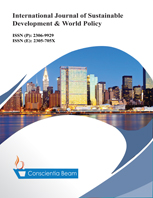Moderating Effect of Demographics on Monetary Motivation and Employees Job Performance Relationship: Evidence from Malaysia
Abstract
This study investigated the moderating effect of demographic factors (age, gender, education level, tenure, and job level) on the relationship between monetary motivation and employees’ job performance at oil and gas offshore production facilities in Malaysia. The outcomes of this study provide useful insight that could influence company’s performance management, resourcing and talent management strategies and policies. Data were collected using self-administered survey questionnaire from 341 employees at oil and gas offshore production facilities of selected companies in Malaysia. Convenience sampling method was used. Quantitative data analyses, which included descriptive, reliability, and inferential analyses were performed using the Statistical Product and Service Solution 21. At the .05 level, the results of the General Linear Model univariate analysis of variance showed that there was a significant moderating effect of tenure and job level on the relationship between monetary motivation and employees’ job performance while gender did not show any significant moderating effect. Age and education level showed weak moderating effect. Employees with tenure of 31 years or more reported significantly higher job performance level compare to their younger counterparts with tenure of 10 years or less. Managers and supervisors scored significantly higher job performance level than technicians.

